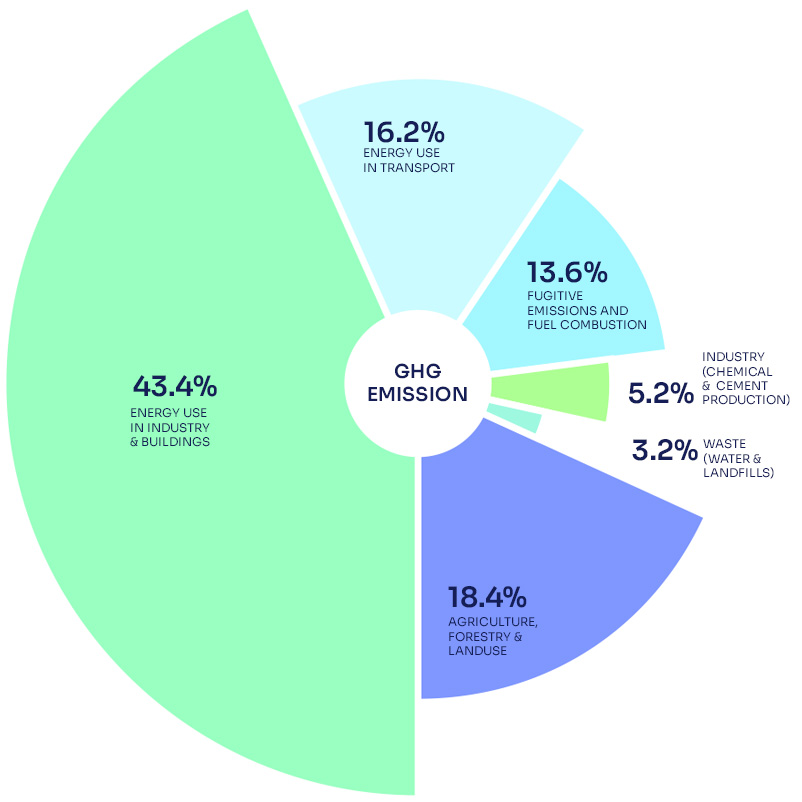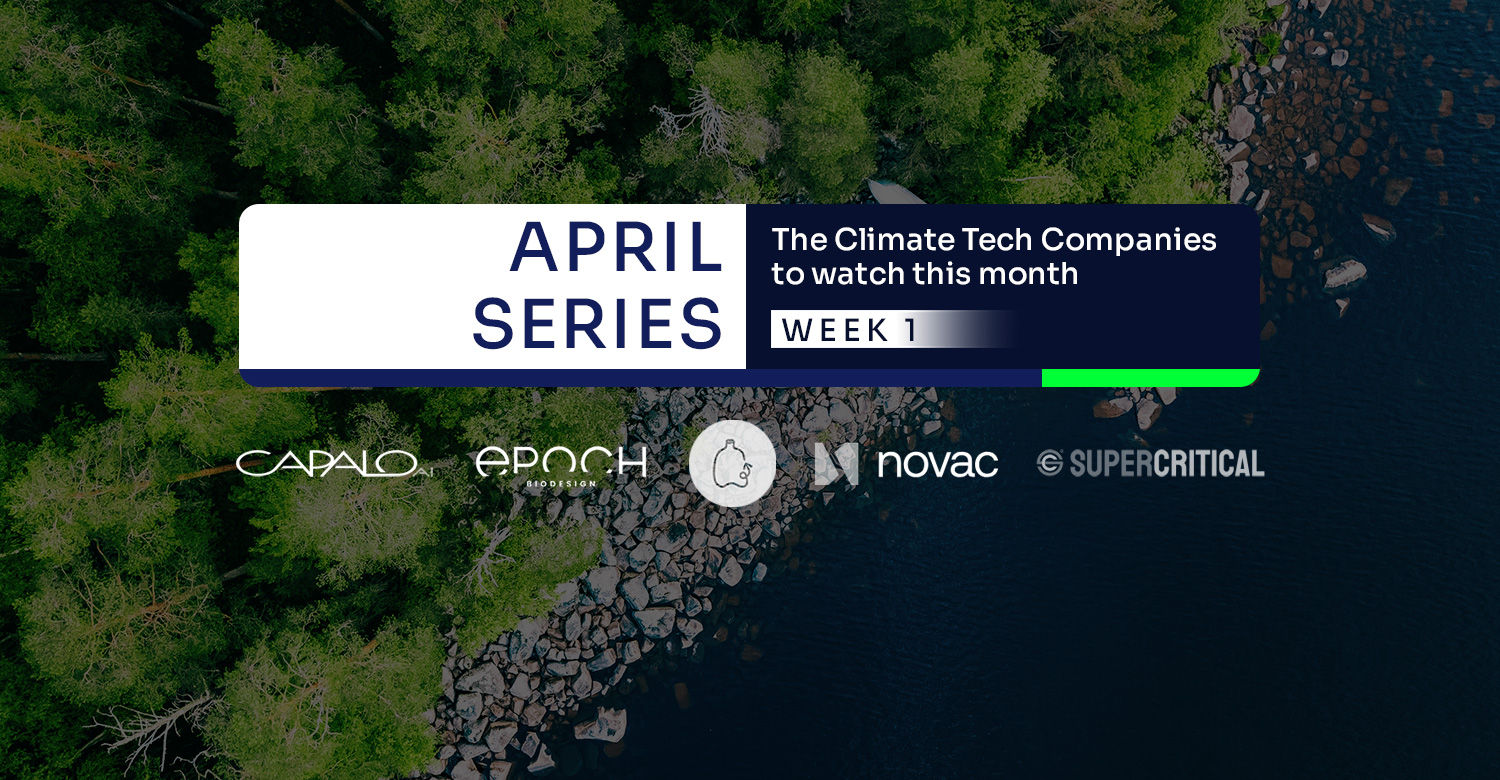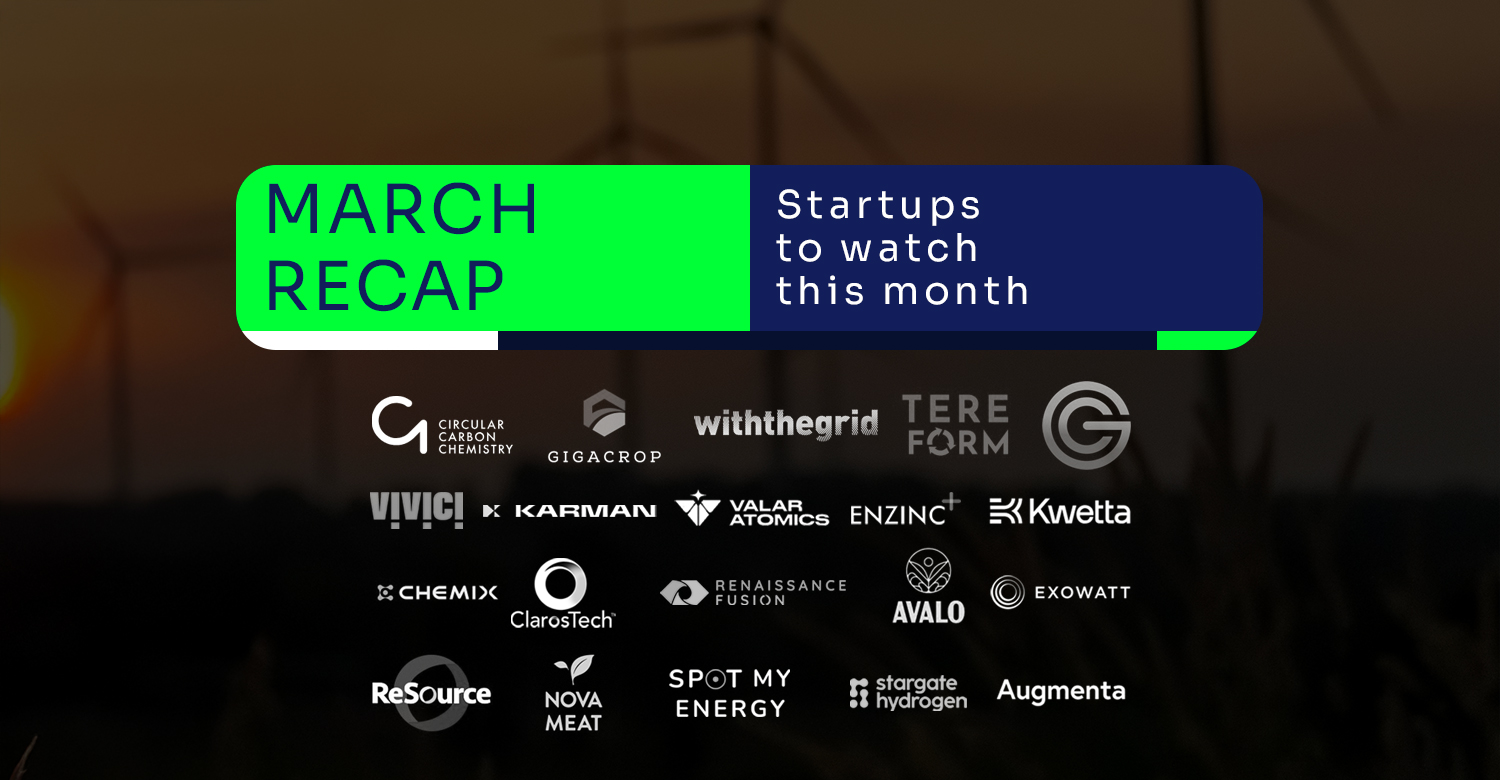January Week 4, 2025: Welcome to our ongoing blog series, where we spotlight the most promising climate tech startups. Each week, we feature five companies and add them to our running list of innovative companies driving solutions across sectors with the highest potential for greenhouse gas (GHG) reductions.
- Energy: How Do We Plug In? This sector represents one of the largest opportunities for GHG reduction. The shift to renewable energy sources, grid modernization, and improved energy storage solutions could reduce emissions by up to 420.60 GT. Startups focusing on grid modernization, energy storage, and decentralized energy solutions are making an impact in transforming how we generate, distribute, and consume electricity.
- Food, Agriculture, and Land Use: How Do We Eat and Grow Things? This sector holds the potential to mitigate between 226.50 and 312.00 GT of emissions. The challenges lie in addressing deforestation, improving soil health, and reducing food waste. Startups promoting regenerative agriculture, plant-based alternatives, and efficient land management practices can play a critical role in transforming food systems and restoring ecosystems.
- Industry: How Do We Build and “Circulate Things”? Industrial processes account for a significant portion of global emissions, with a potential reduction of up to 166.00 GT. The key challenge is decarbonizing heavy industries such as cement, steel, and chemicals. Startups that introduce cleaner production technologies, alternative materials, and carbon capture solutions can reduce emissions while supporting reindustrialization.
- Buildings: How We Live and Adapt? contribute heavily to emissions through energy consumption and construction practices, with potential reductions of up to 88.40 GT. The challenge is transitioning to energy-efficient buildings and sustainable materials while retrofitting existing infrastructure. Startups working on smart building technologies, insulation, and low-carbon materials can drive decarbonization in this sector.
- Transportation: How Do We Move Around? emissions could be reduced by up to 144.30 GT through the adoption of electric vehicles, improved public transit systems, and sustainable logistics. Key challenges include battery technology, charging infrastructure, and transitioning fleets. Startups innovating in mobility solutions, hydrogen fuel cells, and sustainable aviation can accelerate the sector’s decarbonization.
Each month, we add these startups to our running list, which we have categorized based on fuel emission sector data from Project Drawdown.
These sectors are as follows:
Why did we decide to focus on the five specific sectors?
These sectors present immense opportunities for innovation as well as addressing critical challenges related to GHG emissions. By narrowing our focus to these areas, we can better align our mission with impactful solutions and support founders who are driving meaningful change.
By spotlighting these startups, we aim to support founders by providing them with networking and exposure opportunities that can help them scale and finance their solutions.
Do not hesitate to join our collective movement by requesting your membership.
With care,
Guillaume and the SBC TEAM
Industry
Founded: 2015 – Pleasanton, CA, USA
Founders: Medhi Kagar & Amy Haghdoost
Elevator Pitch: Maxterial is pioneering next-generation metallic coating technology that protects against wear, heat, and corrosion while eliminating toxic chemicals such as Hexavalent Chromium and PFAS/PFOS. With a safe, durable, and cost-effective solution, Maxterial is transforming industries including semiconductors, automotive, aerospace, and heavy-duty equipment to improve performance and sustainability.
Problem they solve: Traditional coatings used in manufacturing and industrial applications rely on hazardous chemicals and inefficient processes that contribute to CO₂ emissions, toxic waste, and high costs. Industries need safer, longer-lasting, and eco-friendly alternatives that do not compromise performance.
Impact: Maxterial’s patent-protected coating technology significantly reduces industrial carbon footprints, eliminates toxic substances, and enhances durability, leading to longer-lasting materials and less waste. By providing a scalable, high-performance alternative to conventional coatings, Maxterial is helping industries move toward a safer and more sustainable future.
Stage: Series A.
Interested in Maxterial?
To learn more about their technology or get in touch, see here.
Food, Agriculture & Land Use
Founded: 2020 – Espoo, FI
Founder: Simo Ellilä, Joosu Kuivanen & Anssi Rantasalo
Elevator Pitch: Enifer is revolutionizing sustainable protein production by transforming circular economy by-products into PEKILO® mycoprotein—a nutritious, versatile, and planet-friendly protein. By leveraging biotechnological upcycling, Enifer provides scalable, sustainable food solutions that support healthy and delicious diets while reducing environmental impact
Problem they solve: The global food industry is unsustainable, with land, water, and energy-intensive protein production contributing to deforestation, biodiversity loss, and excessive greenhouse gas emissions. Additionally, food and industrial by-products are often underutilized, leading to waste and lost potential. Enifer addresses this challenge by repurposing these by-products into high-quality mycoprotein, offering a sustainable alternative to traditional protein sources.
Impact: By using industrial by-products as feedstock, PEKILO® mycoprotein significantly reduces food waste, resource consumption, and emissions compared to soy and animal protein production. This circular approach enables a low-carbon, sustainable food system, ensuring nutritional security while preserving the planet’s natural resources.
Stage: Undisclosed.
Interested in Enifer?
If you are interested in learning more, see here.
Transportation
Founded: 2024 – Berlin, DE
Founders: Jakob Kleihues & Dennis Laumen
Elevator Pitch: ENAPI is transforming EV charging infrastructure by providing a transaction broker and clearing house for the industry. By seamlessly connecting Charge Point Operators (CPOs) and eMobility Service Providers (EMSPs) through a single API, ENAPI enables frictionless interoperability, enhanced reliability, and a superior charging experience for EV drivers.
Problem they solve: The EV charging industry is fragmented and lacks standardization, leading to siloed networks, inconsistent user experiences, and inefficient collaboration between charging providers. This complexity makes scaling and managing EV infrastructure difficult, limiting the adoption of electric mobility.
Impact: By streamlining the EV charging network, ENAPI accelerates the adoption of electric vehicles, reducing reliance on fossil fuels and lowering global transportation emissions. Through standardization and enhanced accessibility, ENAPI makes EV charging more efficient and reliable, driving the green mobility transition forward.
Stage: Seed.
Want to learn more about ENAPI?
To learn more about their technology or get in touch see here.
Energy
Founded: 2024 – Sommerville, CA, USA
Founders: Michael Alexander, Charlie Mitchell & Tim Abate
Elevator Pitch: Addis Energy is scaling new ammonia production pathway that revolutionizes the century-old chemical production process. By targeting iron-rich resources in the subsurface, Addis is forging a new pathway for chemical synthesis: injecting engineered fluids that harness the chemical & thermal potential of the earth to produce clean ammonia. This transforms ammonia synthesis into a net energy positive process without any CO2 emissions and enables producing ammonia cheaper than traditional methods.
Problem they solve: The traditional Haber-Bosch process for ammonia production is highly energy-intensive and responsible for nearly 2% of global CO₂ emissions. With rising demand for fertilizers, hydrogen carriers, and industrial chemicals, the world needs a cleaner, scalable, and more economical way to produce ammonia.
Impact: By eliminating fossil fuel dependency and using subsurface resources for synthesis, Addis Energy’s process avoids CO₂ emissions entirely while producing ammonia more efficiently. This innovation decarbonizes the chemical industry, accelerates clean energy adoption, and enables sustainable agricultural and industrial practices worldwide.
Buildings
Founded: 2022 – Inarzo, IT
Founders: Stefano Babbini & Maurizio Montalti
Elevator Pitch: Sqim is redefining sustainable material production by leveraging mycelium-based biofabrication to create next-generation natural materials for the fashion, interior design, and architecture industries. By merging biotechnology and biofabrication, Squim develops eco-friendly, regenerative materials that replace traditional, resource-intensive alternatives, offering a future where human activity harmonizes with nature.
Problem they solve: Industries such as fashion and construction rely on resource-heavy and polluting materials, from synthetic fabrics to non-biodegradable building materials, contributing to waste, deforestation, and CO₂ emissions. Existing sustainable alternatives lack the scalability, durability, and performance needed to replace conventional options effectively.
Impact: Sqim’s biofabrication process upcycles organic waste into high-performance biomaterials, reducing reliance on fossil fuels, plastics, and deforestation-driven materials. By growing instead of manufacturing materials, Sqim’s approach minimizes waste, emissions, and ecological damage, while restoring natural ecosystems through circular and regenerative production methods.
Stage: Series A.
Interested in SQIM?
If you are interested in learning more, see here.
Do you know of other startups we should include in our Startups to Watch Series? Submit to our list!
How do these startups fit in with all the others we have looked at?
Check out our running list of the 400+ climate tech startups to watch we have featured.
















